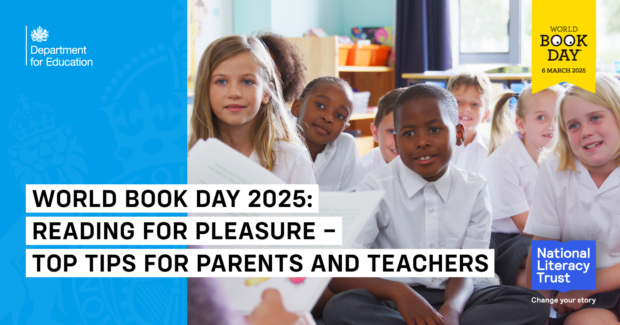Guest post by the National Literacy Trust

World Book Day isn’t just about putting together a great costume idea, it’s about showing children the power of reading.
Reading lets children discover new worlds, meet new people and learn about the past. It sparks imagination, gets children thinking differently and helps develop empathy. Which is why this World Book Day, we want to talk about the importance of encouraging reading for pleasure.
When children enjoy reading and have books of their own at home, it can benefit all areas of their lives, from boosting their confidence and wellbeing to improving their academic performance and life chances – setting them up for a brighter future.
The government’s recent commitment to reading for pleasure as part of its Plan for Change to drive high and rising standards across education comes at an important moment, as our research shows that children and young people’s reading enjoyment has reached a record low.
Working together, we’re supporting families and schools to empower more children and young people with the reading and literacy skills they need to grow, learn and thrive. This includes encouraging families to chat, play and read with their child from birth through Start for Life, through to the UK-Ukraine school partnerships programme, where pupils will explore reading as a tool to build literacy skills, cross-cultural understanding, expand horizons, and boost confidence and wellbeing.
This World Book Day, we’re sharing top tips for parents and teachers to help children and young people unlock the magic of books and discover a love of reading that can change life stories.
Top tips for parents
- Read together. Whether your child is discovering picture books or reading independently, sharing stories will give you a chance to spend valuable time together, relax and bond over things you both find interesting.
- Find time to share stories. Life is busy! But if you can try and find 10 minutes a day to read with your child, no matter their age, it can make a big difference. Choosing the same time to share stories each day will help reading become a normal part of your daily routine.
- Bring stories to life. It can sometimes feel embarrassing to do but your child will love you using different voices and sound effects to bring stories to life. Our latest research shows that listening to audiobooks together is another great way to experience lively storytelling, as well as to encourage reading and enhance reading enjoyment.
- All reading counts. Tapping into your children’s interests is a great way to get them reading, learning and having fun. If they love football, read the sports pages of a newspaper together; if they love dinosaurs, find a roar-some magazine to explore; or if they enjoy baking, find a recipe book.
- Find inspiration at your local library. Discover a wide range of free books, ebooks, audiobooks, comics and more to borrow and take home from your library, as well as engaging events for the whole family to enjoy. Find your local library.
Top tips for teachers
- Celebrate reading all year round. Whether it’s World Book Day, National Poetry Day or National Storytelling Week, there are plenty of opportunities to celebrate reading throughout the school year. Explore our literacy events calendar for inspiration.
- Make your school library count. Pupils’ reading, wellbeing and learning journeys will benefit from a school library that is pupil-centred, stocked with high-quality reading materials that reflect the rich diversity of your school community, and values fiction, non-fiction, poetry, comics and magazines equally. If you don’t have a school library, learn more about the Libraries for Primaries campaign or contact your local authority School Library Services.
- Let pupils lead the way. To encourage and empower pupils to find enjoyment in reading, it’s important that they are given agency and choice over the reading they do and that they are given opportunities to discover a broad range of reading materials that ignite their curiosity – whether fiction or non-fiction, reading materials in print or on screen, or audiobooks and podcasts.
- Help pupils become subject experts. Reading can open the door to a range of topics and model key vocabulary to help pupils master disciplinary literacy across the curriculum. Create a display for your subject with recommended reads and listens to encourage pupils’ independent and extended study around a topic.
- Meet pupils ‘where they’re at’. Technology plays a big role in pupils’ literacy, learning and lives. Leveraging young people’s enthusiasm for technology to support their reading can provide benefits for pupils of all abilities. Try introducing audiobooks or podcasts in the classroom to help pupils understand specific vocabulary, enhance reading comprehension and as stimulus for creative work.